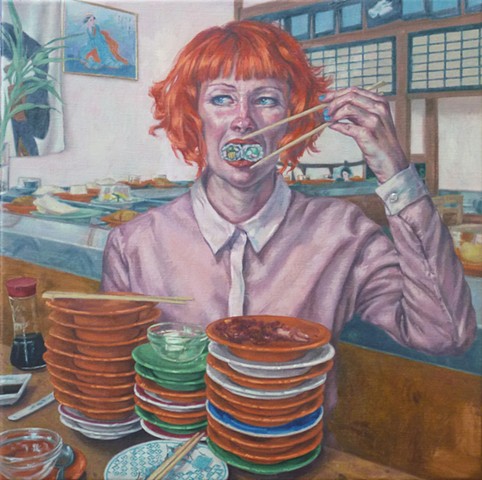APPETITE
There is a lone figure in Roxana Halls’s Sushi, 2014 (oil on canvas, 75 × 75 cm) but the mood is very different. A glorious sense of excess has replaced introspection. Halls’s childhood desire to be an actor, a fascination with cabaret, research periods in Berlin (facilitated by winning the Villiers David prize in 2004), and her London studio which was once the saloon bar of a 1930s theatre, all contributed to her aesthetic. She constructs her own props, sets, and costumes with the same convincing magic as Kirsty Mitchell’s photographic ‘Wonderland’ series, uses herself as a character with the lack of vanity and conviction we see in Cindy Sherman’s transformations, and creates scenarios that sometimes recall the abject scenes in Paula Rego. Referring to her ‘Appetite’ series to which Sushi belongs, Halls said, ‘eating is so much more than a biological process. It is fraught with tension and expectation.’i Protesting societal expectations (that demand women show restraint around food, that polices their diets, rewards them for conforming to a particular body type, or insists they consume in a manner deemed ‘sexy,’) her figures rebel. They eat with their mouths wide open; they over-eat, not caring about the consequences on their appearance. Sushi is such a riot of complementary colours – blue fingernails against a shock of orange hair; green sushi at red lips – it seems to mock the minimal Japanese interior with its paper screen and lone bamboo shoot. Perhaps this character has fashioned herself after the traditional Japanese print, also blue and orange, on the wall but she has refused its sinuous lines in favour of a sensible shirt. There are neatly stacked piles of empty dishes (all hers) and the promise of more food to come from the conveyor belt behind. With a nod to Hopper, perhaps, she is still here when everyone else has gone home. But she has none of the melancholy of Hopper’s late-night loners; this is a woman who does not want to stop eating. Adroit with her chopsticks, she subverts the daintiness of a single portion of sushi by stuffing two in her mouth at once. And, freed from the constraints of her domestic interior, she does not even have to consider the washing-up.
Marie-Anne Mancio - Catalogue Essay - No Reserve
Exhibited in
FUNNY HA HA, Maddox Gallery, London 2022/23
NO RESERVE, Leicester Contemporary, Leicester 2021
APPETITE, Hayhill Gallery, London 2014
